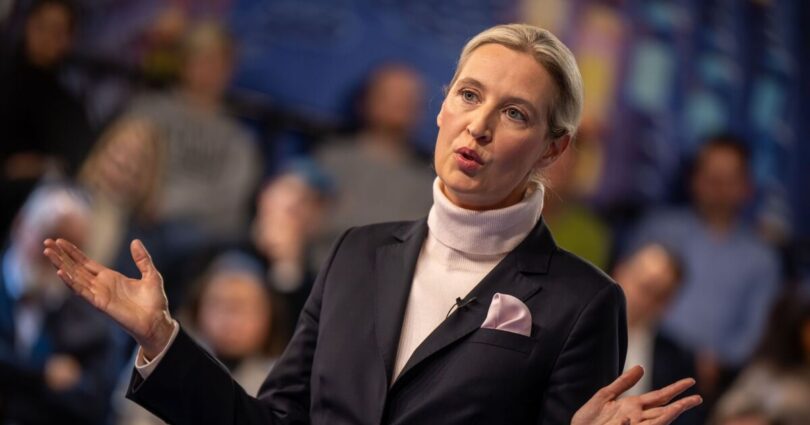The AfD are projected to win 20% of the vote on Sunday (Image: Getty)
The eyes of the world will be on Germany on Sunday as voters head to the polls to decide who will run their next government.
The snap election was triggered by the collapse of Chancellor Olaf Scholz‘s centre-left coalition in November 2024.
While the centre-right Christian Democrats (CDU) are expected to win the most support, coverage has focused on the spiking popularity of the far-right Alternative for Germany (AfD) party, led by Alice Weidel.
Polls suggest that the CDU’s Friedrich Merz will be the country’s next chancellor, with 30% of the vote, but the AfD is projected to come a close second, with 20% – double their performance at Germany’s last federal election.
Against a backdrop of global and domestic turmoil, the election’s main talking points have been controlling immigration and reinvigorating Germany’s ailing economy.
But what exactly is the AfD and what does its rising popularity mean for German politics? We’ve broken down everything you need to know about the populist group and its frontwoman, Alice Weidel.

Alice Weidel has led Germany’s AfD party since 2017 (Image: Getty)
What is the AfD?
The Alternative for Germany party was created in 2013, initially as an anti-European Union group focused on economic issues in the wake of the 2008 financial crisis.
It quickly evolved into a hardline anti-immigration party as the country reckoned with a migration crisis in 2015, however, and has backed calls for a cap on migrants entering Germany, with a particular focus on Muslims.
The AfD has been led by Alice Weidel, 46, since 2017, who is herself a controversial figure. The West German drew criticism in 2018 when she said: “Burqas, girls in headscarves, knife-wielding men on government benefits and other good-for-nothing people are not going to ensure our prosperity.”
In 2024, a German court ruled that the group was officially under suspicion of extremism and in 2019, it was judged that regional leader Björn Höcke could legally be called a fascist.
Despite this, the AfD has recieved backing from US President Donald Trump and Elon Musk, who hosted an interview with Weidel on his platform X in January.
Can the AfD win the German election and what is the ‘firewall’?
The AfD is very unlikely to get into government after this weekend’s election because of a « firewall » policy adhered to by Germany’s other political parties since the collapse of the Nazi regime in the mid-20th century.
It means that the other parties in the running, including the CDU, Scholz’s Social Democrats (SDP) and the Greens, would refuse to enter into a coalition with the AfD – so far barring the party from entering state or national government.
While the CDU’s projected win of around 30% of the vote means it is likely to enter into a coalition with either the SDP or the Greens, the main story of the election could be the AfD’s ascent to second place in the polls despite its ostracisation.
Merz has categorically ruled out working with the AfD, but recent polling suggests Weidel’s party could win 145 seats in the Bundestag to the CDU’s 220 – destabilising the balance of German politics, which has generally held far-right groups at bay since the 1940s.
Which parties in Germany want to work with Alice Weidel’s AfD?
Despite the country’s long-held resistance to populist rhetoric, the AfD has managed to gain traction, particularly with Germany’s young people, by basing its messaging on a slew of terror attacks carried out by asylum seekers or immigrants.
Out of the country’s major parties, both the SDP and the Greens are left-leaning and avowed opposers of the AfD, so a coalition with Weidel’s group would be all but off the cards.
Sahra Wagenknecht’s BSW party claims to be a “left conservative” group and shares the AfD’s euroscepticism and focus on immigration, but is only just over a year old and could scoop less than 5% of this year’s vote. The centre-right FDP and far-left Linke are similarly unlikely to make significant gains.
There are fears that Merz will weaken the firewall once he becomes Chancellor, however. The CDU leader attracted criticism, including from his predecessor Angela Merkel, for accepting the AfD’s votes on a controversial immigration bill last month.

Friedrich Merz is expected to become the next German chancellor (Image: Getty)
What is Alice Weidel’s stance on migration?
Despite Elon Musk claiming that Weidel couldn’t be far-right because she « has a same-sex partner from Sri Lanka »,the AfD leader has built her platform on a raft of controversial policies, including the mass deportation of immigrants from Germany.
She has used the term « remigration » – which critics have associated with ethnic cleansing – to refer to deporting huge numbers of migrants from the country, and pledged to close Germany’s borders within her first 100 days in power if elected.
Its commitment to « remigration » has put the party at odds with even its right-wing European counterparts, with Marine Le Pen’s French National Rally expelling the AfD from its European Parliament group last year.
Inside Germany, however, the hardline position on immigration only appears to be increasing its momentum in the polls, with concerns about asylum seekers among the main issues on voters’ minds going into the polling booths on Sunday.
What is Alice Weidel’s position on Russia and the war in Ukraine?
The war in Ukraine will also be a hot topic in the German electorate’s minds when deciding who they want their next leader to be.
Germany is the second-largest donor of military aid to Ukraine after the US, and the AfD has echoed President Trump’s calls for the conflict to be ended by an agreement between Kyiv and Moscow – even if it puts the former in a vulnerable and disadvantaged position.
Weidel has also campaigned to cut military aid from Berlin and remove sanctions on Moscow.
She told German tabloid Bild: « We want to have very good relations with our European neighbours… But we also want to have very good relations with the big powers. That includes Russia.
« We want to end the sanctions policy, which primarily harms our country. »
Source link








